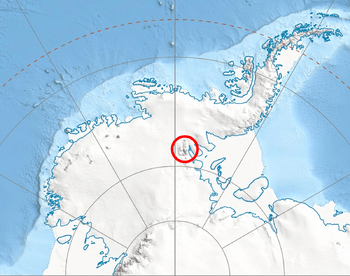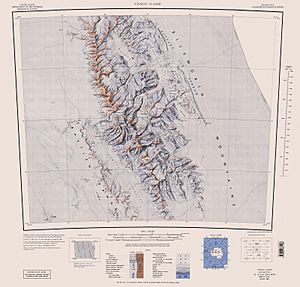Mount Craddock facts for kids
Quick facts for kids Mount Craddock |
|
|---|---|
| Highest point | |
| Elevation | 4,368 m (14,331 ft) |
| Geography | |
| Location | Antarctica |
| Parent range | Sentinel Range |
| Climbing | |
| First ascent | January 1992 |
Mount Craddock is a very large mountain in Antarctica, the coldest continent on Earth. It is part of a big group of mountains called the Craddock Massif. This mountain is located in the Sentinel Range, a long chain of mountains in Antarctica. Mount Craddock is the ninth highest mountain on the entire continent. It is connected to another peak, Mount Strybing, by a snowy pass known as Karnare Col. People first climbed Mount Craddock in January 1992.
Naming Mount Craddock
The name Mount Craddock has an interesting history. In 1965, the name was first suggested for the entire group of mountains we now call the Craddock Massif. However, over many years, maps started to show Mount Craddock as only the southernmost peak of this large group.
To avoid confusion, in 2006, a group called the Advisory Committee on Antarctic Names (US-ACAN) officially decided to use the name Mount Craddock only for that specific southernmost peak. This helped make sure everyone knew exactly which mountain was being referred to.
Who Was J. Campbell Craddock?
Mount Craddock was named after J. Campbell Craddock (1930–2006). He was a very important scientist. Craddock led a team from the University of Minnesota that traveled to Antarctica in the early 1960s.
His team studied the geology of the area, which means they looked at the rocks and how the land was formed. They also made maps of the Sentinel Range and the Heritage Range, which are both parts of the Ellsworth Mountains. Before that, in 1960–61, Craddock also led another team that explored the Jones Mountains in Antarctica.
Peaks of Craddock Massif
Mount Craddock is the second-tallest point within the Craddock Massif. The highest peak in this group is Mount Rutford. Mount Rutford was named after R. H. Rutford, who was another geologist and a friend of J. Campbell Craddock.
The Craddock Massif also includes two other notable peaks: Rada Peak and Bugueño Pinnacle. These peaks were named after Camilo Rada and Manuel Bugueño. They were climbing partners with Damien Gildea, who is a well-known researcher and climber in Antarctica.
 | George Robert Carruthers |
 | Patricia Bath |
 | Jan Ernst Matzeliger |
 | Alexander Miles |



